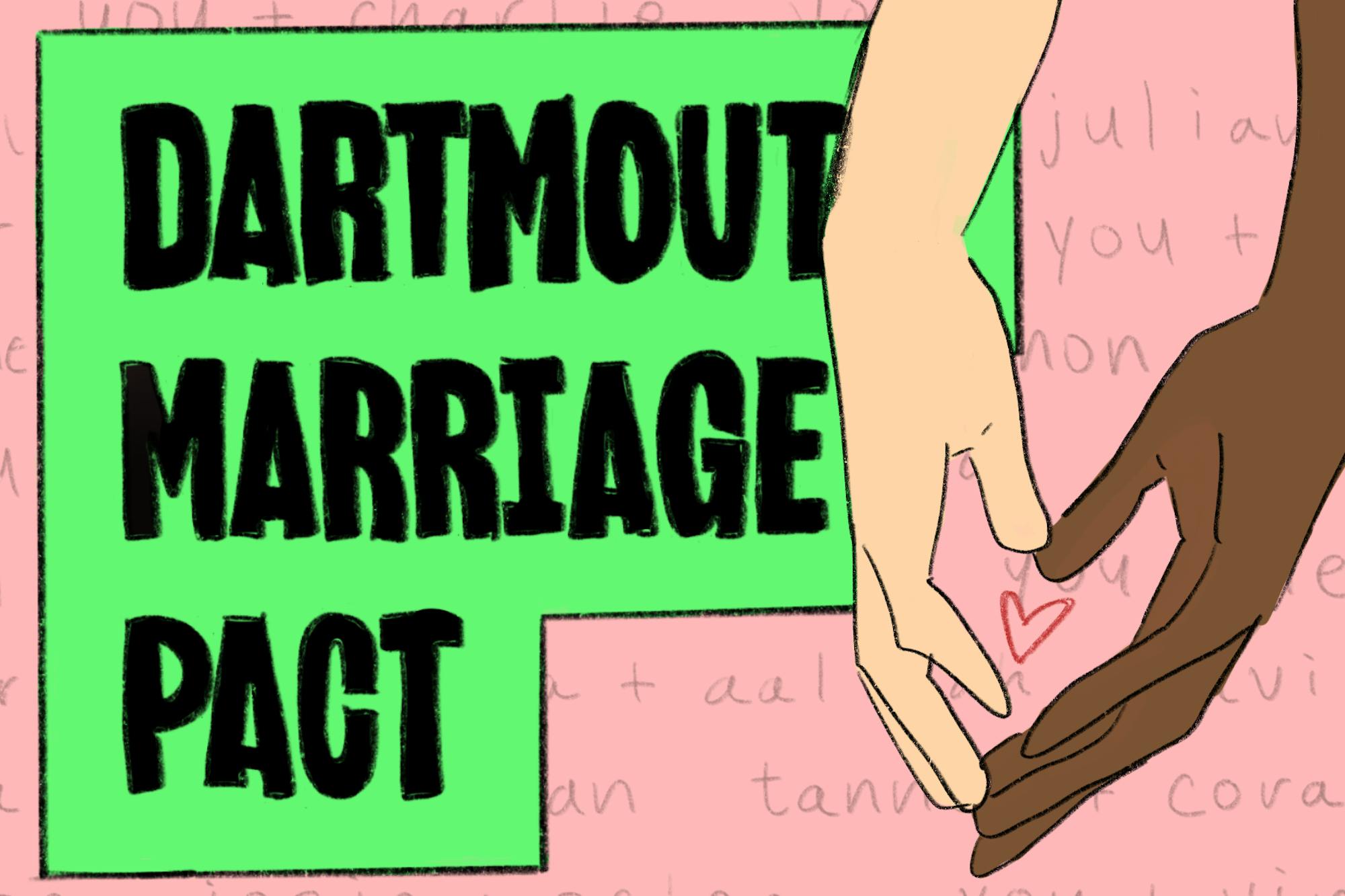Don’t we all have that one “platonic” friend from high school we promised to marry if we’re still single at 30?
According to its website, the Dartmouth Marriage Pact promises a better, or at least smarter, solution to your high school marriage pact, advertising itself as “your best backup plan out of everyone on campus … a match made via groundbreaking algorithms and a little linear algebra. Swoon!”
However, this year, the algorithm created by two Stanford University students for their economics final is becoming even more brazen — it looks like the robots are taking over. Marriage Pact sent out not only matches but five rounds of next-best matches. Its creators also invented a new app with the same algorithm but with more questions that hold the enticing revelation of who you match with.
Marriage Pact seems to have gained traction at Dartmouth this year through enticing marketing and advertising campaigns. One strategy they used was hiring campus representatives, or undergraduates whose role was to spread the word about the algorithm.
While riding up to campus on the Dartmouth Coach at the start of the term, Dazea Callender ’26 was approached with an enticing offer mid-nap by her seat-mate, a student involved in the behind-the-scenes of Marriage Pact:
“He literally woke me up, and we chatted … a couple of days later, I got an email that asked me to help me with this project,” she said.
Callender described her experience marketing for Marriage Pact as being “on the ground.” Interestingly, Callender said she doesn’t know much about the creation of Marriage Pact’s new app and was “just as surprised as everybody else” with her match.
Being in the dark despite being involved in word-of-mouth marketing only adds to the sense of mystery that makes the Marriage Pact such an enticing Dartmouth tradition. Knowledge of this elusive and seemingly all-knowing algorithm was shared exclusively with Callender and two others, who were told to start spreading the word by Marriage Pact representatives. And spread the word they did, with over 2000 Dartmouth students eventually joining the Marriage Pact.
But how likely are Dartmouth students to follow through with Marriage Pact or use the new app, in comparison to other campus matchmaking programs, such as Deep and Last Chances? While Deep is an app focused on shooting your shot with your crush without anxiety, Last Chances is a website where you enter the names of your crushes to see whether you match with one another.
“I did all the next, next, next [chances], but I never reached out, nobody ever reached out to me,” Callender said. “So, it kind of dead-ended pretty quickly. But it was fun to talk with people like, ‘Who’d you get?’”
Others shared similar sentiments to Callender about the outcomes of the Marriage Pact. Resulting in light-hearted flitzing at best and another awkward run-in on this ever-so-small campus at worst, most students believe Marriage Pact is just for fun.
“Like doing the polar plunge or going on First-Year Trips … you participate because you like traditions, and there are lots of traditions on this campus,” Luca Gandrud ’27 said.
Perhaps another cause of Marriage Pact’s “dead-end” results is the timing of it all. Jeffrey McAtee ’27 highlighted how it can be difficult to follow through with plans at this time in the term.
“To all the people saying, ‘Happy marriage pact!’ It’s week five,” McAtee said. “We have way bigger problems. And people are spending the time meeting up with these people. I’m like, ‘Wow, I wish I had the time for that.’”
The hectic, 10-week sprint is just one hindrance to dating at Dartmouth, as well as the infamous D-Plan, Julia Patterson ’24 said.
“I feel like [the D-Plan] makes [dating] really difficult because if you’re in your sophomore or junior year, you are pretty much guaranteed to have to be long distance, and that puts a lot of strain on relationships with people,” she said. “There’s a lot of people who are like, ‘I just won’t date,’ and instead, it has enforced hookup culture. It’s already easy for hookup culture to flourish because it’s college, but then it makes it worse.”
The busy life of a college student seems to be amplified by Dartmouth’s extremely fast-paced nature, especially when coupled with the contrasting schedules of most upperclassmen. Trying to promote a dating program on a campus lacking a robust dating culture may prove to be an insurmountable task for Marriage Pact.
When asked to rank Marriage Pact, Last Chances and Deep, Callender tied Last Chances and Marriage Pact for first place in encouraging similar excitement levels on campus, though she believes both result in very little follow-through. But the hail-mary nature of Last Chances’ last-ditch effort poses problems like the fact that students might “put everybody ever” down as a crush, and “nobody ever follows through,” according to Callender.
She put Deep last, saying: “It seems not very effective. I don’t really understand how it works … I’ve also just never heard of anyone using it.”
Sorry Deep, better luck next time!
A common thread is emerging: fun and flirty to no fruition. Maybe we should all just shoot our shot IRL (in real life) because, as I said before, the robots are taking over.
Callender left me with these lasting words I suggest we all include in our daily affirmations: “Perhaps algorithms are not the way. A natural connection might be best.”
Or, you know, you can just marry your high school marriage pact.




